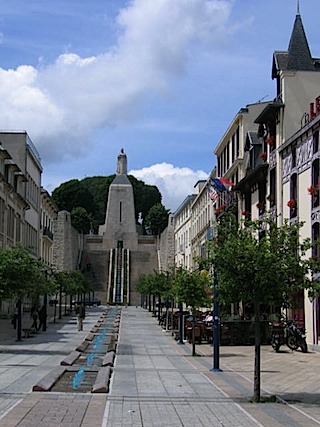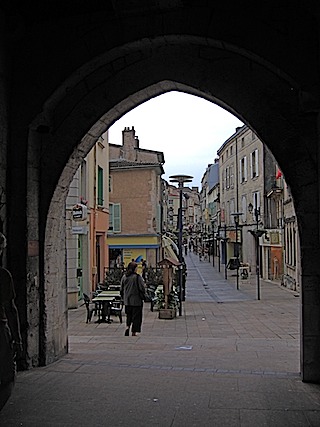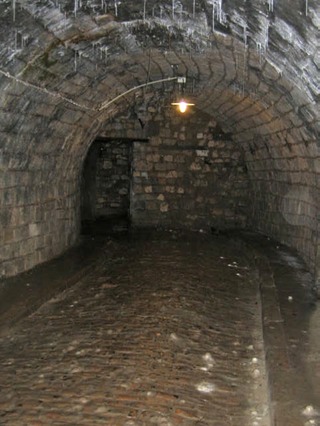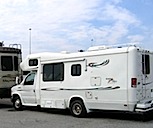Our campground in Verdun was probably the best one so far. It had everthing we needed, including free and good internet access and a wide paved boulevard that made it very easy to get into and out of our site. It was about a 20 minute walk into the town. Verdun is a small, quite depressed town, despite an energetic riverside open space with stores and cafes. Yachts and houseboats tied up along the quay, which had been built as a gift from Great Britain after WWI. But apart from this space and a few side streets, the city center looked like it could use some cleaning, paint and repair. Still, it was drawing many tourists to its war memorials and museums.


We took the four-hour tour to four locations about 10 miles outside the city. The tour guide spoke a little English and took the time to explain briefly what we were seeing. Much of the battlefield area is now forested: originally it had been farm land but was bombed so heavily during the 300 days of the Battle of Verdun that 90 years later the landscape remains pockmarked and scarred. Nine villages were completely destroyed and not rebuilt because they were too dangerous to enter, and much of the surrounding area remains off limits because of the possibility of unexploded ordinance. We visited an underground fort, water dripping on our heads, which 3000 men had occupied during the battle, first French, then German, then French again. One room was walled off because 900 German soldiers, victims of an explosion, were buried there.


Then we went to the Ossuary. In front, 15,000 French soldiers are buried, while the Ossuary itself holds the remains of 130,000 (yes, that’s right--one hundred thirty thousand) unidentified French and German soldiers. The building is like a huge granite temple the length of two football fields. But the strangest thing is that you can go out to the back side and look in small windows and see the bones of these men. Bones piled upon bones.
The next day we visited the town’s underground citadel that has been turned into a tourist attraction. It had housed up to 10,000 men as they prepared to go to the front lines. It now features a little electric car, like a fun house ride, that drives you through a series of scenes explaning how the soldiers lived there and on the front. We now know more about WWI than we ever learned in any history class. It was all quite an experience.
We drove on to Rheims where we had a camperstop just off the motorway in mind. We were hoping to find it and park and then either leave the city after visiting the cathedral or stay for the night if it proved to be a safe place. We (and our GPS) were unprepared for the volume of detours and road construction that we were confronted with in the city.


But we finally prevailed: we toured the city and their remarkable cathedral and stayed the night. We were safely tucked behind a youth hostel with another motorhome in a parklike setting. It is not unusual for youth hostels to offer free camper services and overnight parking if they have space.
While in Verdun, we had decided to take a major detour, so on Sunday we drove to Paris, which we had been planning to avoid. We were going to leave Rover in the campground and take the EuroStar through the Chunnel to London just for one night so we could see “Arcadia,” a play by Tom Stoppard. (Our former students--hi to you all--will understand the impetus behind this decision.) But first we had to get through Paris traffic to the campground. Because this was on a Sunday, we thought traffic might be lighter and it was . . . until we reached the park that we had to go through to get to the campground. Everyone in Paris was at the park, nearly all of them with a car. Cars lined every street and were parked down the center of the streets so that we could barely make it through. In addition, we tried to follow the campground signs but found some of the roads were blocked off because there was a huge outdoor concert about a half mile from the campground (we heard it until midnight). Even the police couldn’t tell us how to get through, so it was a good thing we had been there last year and knew where we had to keep heading. It was a great relief to finally get to the campground and find they had room for us because they had not responded to our email request for a reservation.
The next day we took the bus to the metro, on which you can get anywhere in Paris--that is, if you can get to a Metro station. Even the bus had trouble getting through the traffic. It took us 20 minutes to go 2/3 of the way around a large traffic circle to the Metro stop. Then we walked our legs off around Paris, scouted out the train station, picked up our tickets, and spoke with an old man who sold David a Tour de France tshirt and claimed to be very sure Lance Armstrong would win again.
Tuesday we locked Rover up tight, took the train to London (just over 2 hours, with security just like at an airport)--saw the play (wonderful)--stayed at our favorite hotel--went to our favorite Starbucks--saw the Monets at the National Gallery--walked through the gift shop at the British Museum--and took the train back to Paris, just in time for the evening rush hour on the subway and bus back to the campground. Thursday we took a different and slightly less busy route out of Paris, where we took only one wrong turn that eventually got us on a very good road.
We are now headed north with only one week to go. We have started to think about how we are going to get Rover cleaned up and get everything packed away. We can’t just drive it into our driveway and unload everything. So we are trying to eat up what we have, keep clean the things we will leave behind, and decide just what goes home with us besides a suitcase full of dirty clothing. Tonight we are staying south of Calais right on the English Channel. There is only a low sand dune between us and the water. It is strange to think that a few days ago we were on a train going under it. Tonight we watched ferries pass and dock at Calais. Maybe someday we’ll put Rover on one and see if we can drive on the left side of the road.

